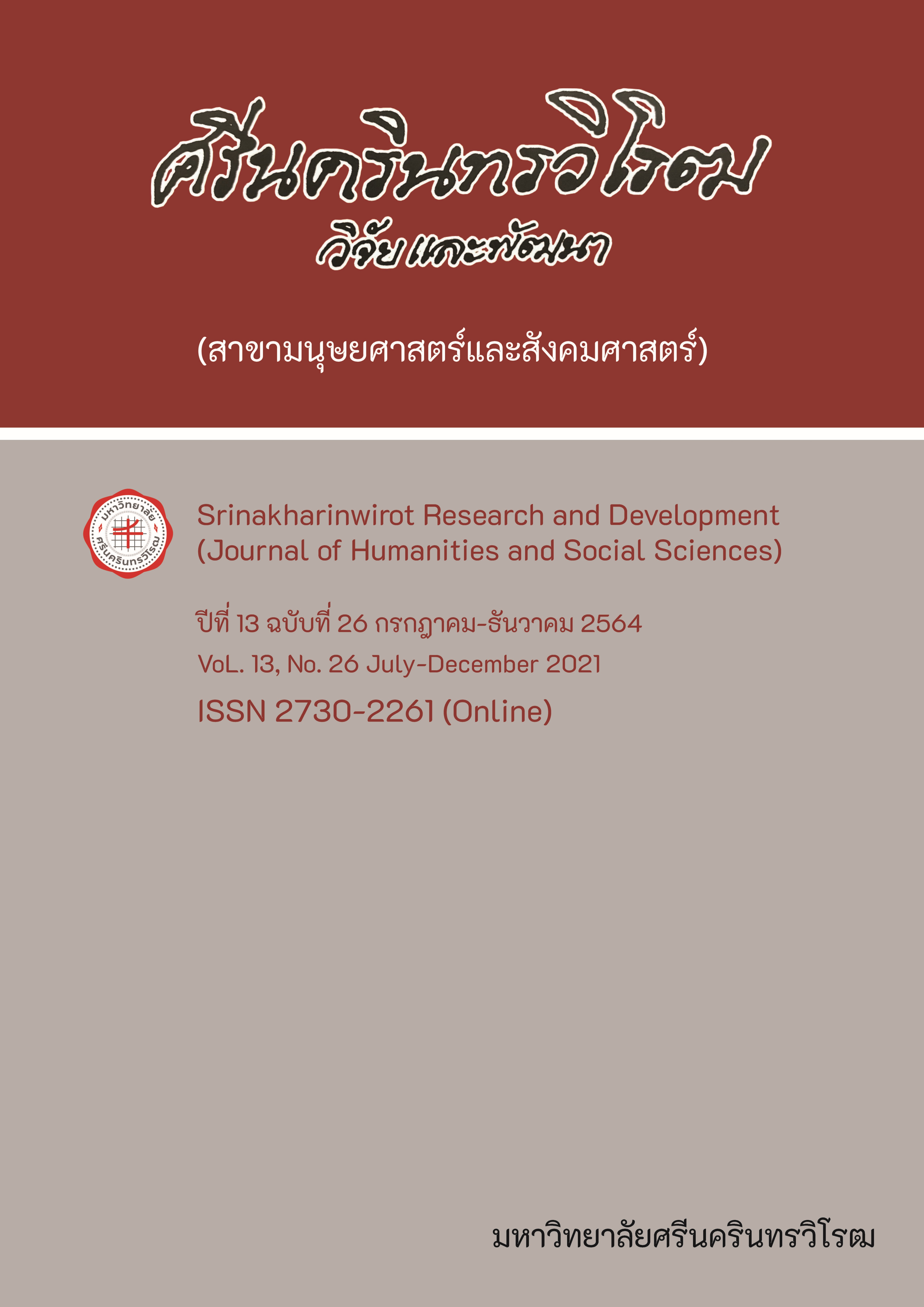THE LESSON LEARNED FROM ENCOURAGING SUFFICIENCY ECONOMY PHILOSOPHY HUAIKHAYENG COMMUNITY, THONG PHA PHOOM, KANCHANABURI PROVINCE
Keywords:
Self-Sufficiency Economy Family, Self-Reliance, Sustainable DevelopmentAbstract
This research is aimed to study the role of sufficiency economy philosophy and different types of practices carried out since 2003 by Huaikhayeng community, Thong Pha Phoom, Kanchanaburi province. The researcher utilized ex post facto research, in depth Interview and Group Discussion as research tools. The study found that the community has worked under bottoms up pattern allowing the locals to play a part in encouraging sufficiency economy in the community and cooperate with local councils. The council was established as “open council” welcoming members from both official and non-official selection processes to work following the targeted goals. The council was financially and informatively supported by both public and private organizations. There are 3 main areas that the community is responsible for: economic development, environmental development and morality encouragement. Concerning with economic development, the community has established the project namely “Sufficiency Economy Family” and persuades the locals to join by supporting livestock, and crop seeds to create income and decrease domestic spending among the locals. This study has been carefully conducted with systematic community research processes as well as strict mutual agreements among the community members. These are all key factors leading to the success of the project and the community in encouraging sufficiency economy philosophy.
Downloads
References
พัชรินทร์ สิรสุนทร. (2556). แนวคิด ทฤษฎี เทคนิค และการประยุกต์เพื่อการพัฒนาสังคม. กรุงเทพฯ: สำนักพิมพ์แห่งจุฬาลงกรณ์มหาวิทยาลัย.
อุ่นเรือน เล็กน้อย. (2560, เมษายน-มิถุนายน). เศรษฐกิจพอเพียงและทฤษฎีใหม่ วิถีสู่ความยั่งยืนจากคำสอนพ่อ. วารสารสิ่งแวดล้อม, 21(2), 13-26.
สำนักงานคณะกรรมการพัฒนาการเศรษฐกิจและสังคมแห่งชาติ. (2558). ทิศทางของแผนพัฒนาเศรษฐกิจและสังคมแห่งชาติ ฉบับที่ 12. กรุงเทพฯ : สำนักงานคณะกรรมการพัฒนาการเศรษฐกิจและสังคมแห่งชาติ.
ณัฏฐพงศ์ ทองภักดี. (2550, กันยายน). ปรัชญาของเศรษฐกิจพอเพียง: ความเป็นมาและความหมาย. วารสารพัฒนบริหารศาสตร์, 47(1), 1-25.
Unruan Leknoi, & Suched Likitlersuang. (2020, December). Good practice and lesson learned in promoting vetiver as solution for slope stabilisation and erosion control in Thailand. Land Use Policy. 99(2020), 105008.
กรมทรัพยากรธรณี. (2561). หนังสือสรุปเหตุการณ์ธรณีพิบัติภัย: จังหวัดกาญจนบุรี. กรุงเทพฯ: ศูนย์ปฏิบัติการธรณีพิบัติภัย กรมทรัพยากรธรณี.
Ary, D., Jacobs, L. C., & Sorensen, C. K. (2010). Introduction to research in education. 8th ed. Belmont, CA: Wadsworth.
Harold G. Lord. (1973). Ex Post Facto Studies as a Research Method. Special Report No. 7320. Washington, D.C.: ERIC Clearinghouse.
อรรณพ เยื้องไธสง, และอุ่นเรือน เล็กน้อย. (2563, มกราคม-เมษายน). ความรู้: อิทธิพลต่อกระบวนการตัดสินใจยอมรับนวัตกรรมระบบหญ้าแฝกในพื้นที่เสี่ยงต่อการเกิดดินถล่ม. วารสารนานาชาติ มหาวิทยาลัยขอนแก่น สาขามนุษยศาสตร์และสังคมศาสตร์, 10(1), 130-146.
อรรณพ เยื้องไธสง, และอุ่นเรือน เล็กน้อย. (2563, กรกฎาคม-ธันวาคม). อิทธิพลของการรับรู้ต่อการยอมรับนวัตกรรมการใช้ระบบหญ้าแฝกเพื่อป้องกันดินถล่มในพื้นที่ทางการเกษตร. วารสารสังคมศาสตร์ มหาวิทยาลัยศรีนครินทรวิโรฒ, 23(2), 347-356.
สถาบันพัฒนาองค์กรชุมชน. (2563). สภาผู้นำชุมชนตำบลห้วยเขย่ง อำเภอทองผาภูมิ จังหวัดกาญจนบุรี. สืบค้นเมื่อ 12 สิงหาคม 2563, จาก https://web.codi.or.th
Luke Sinwell. (2012, March). Transformative left-wing parties’ and grassroots organizations: Unpacking the politics of “top-down” and “bottom-up” development. Geoforum, 43(2), 190-198.
Jeroen Mens, Ellenvan Bueren, Ruben Vrijhoef, & Erwin Heurkens. (2021, March). A typology of social entrepreneurs in bottom-up urban development. Cities. 110(March, 2021), 103066.
Jean-PierreEl Asmar, John Obas Ebohon, & Ahmad Taki. (2012, February). Bottom-up approach to sustainable urban development in Lebanon: The case of Zouk Mosbeh. Sustainable Cities and Society, 2(1), 37-44.
พัชรินทร์ สิรสุนทร. (2550). ชุมชนปฏิบัติการด้านการเรียนรู้: แนวคิด เทคนิค และกระบวนการ. กรุงเทพฯ: สำนักพิมพ์แห่งจุฬาลงกรณ์มหาวิทยาลัย.
เสรี พงศ์พิศ. (2551). แนวคิดแนวปฏิบัติยุทธศาสตร์พัฒนาท้องถิ่น. กรุงเทพฯ: พลังปัญญา.
ไพศาล เนาวะวาทอง, และธวัชชัย ศุภดิษฐ์. (2551, ตุลาคม). การจัดการชุมชนเศรษฐกิจพอเพียง: กรณีศึกษาหมู่บ้านคำปลาหลายตำบลบ้านดง อำเภออุบลรัตน์ จังหวัดขอนแก่น. วารสารการจัดการสิ่งแวดล้อม, 4(2), 38-49.
ฉลาด จันทรสมบัติ, ทานตะวัน สิงห์แก้ว, ประจักษ์ อาษาธง, และรุ่งทิพย์ สิงพร. (2554, พฤษภาคม- สิงหาคม). การศึกษาการพัฒนาหมู่บ้านนวัตกรรมเพื่อการพึ่งตนเองตามแนวทางเศรษฐกิจพอเพียงชุมชนวังจาน ตำบลนาข่า อำเภอวาปีปทุม จังหวัดมหาสารคาม. วารสารการบริหารและการพัฒนา มหาวิทยาลัยมหาสารคาม, 3(2), 86-105.
อภิชาติ กิตติศักดิ์นาวิน, และธีรศักดิ์ อุ่นอารมย์เลิศ. (2559, กรกฎาคม-ธันวาคม). การพัฒนาตัวแบบการจัดการนวัตกรรมภูมิปัญญาเศรษฐกิจพอเพียงของปราชญ์ชาวบ้านเพื่อเสริมสร้างการพัฒนาที่ยั่งยืน. วารสารศิลปากรศึกษาศาสตร์วิจัย, 8(2), 103-115.
วิทูลย์ แก้วสุวรรณ, เกษมชาติ นเรศนีย์, และบุญเรือง ศรีเหรัญ. (2558, กันยายน-ธันวาคม). ยุทธศาสตร์การพัฒนาชุมชนตามแนวปรัชญาเศรษฐกิจพอเพียง. วารสารวิจัยและพัฒนา วไลอลงกรณ์ ในพระบรมราชูปถัมภ์, 10(3), 285-294.
John Elkington. (1998). Cannibals with Forks: The Triple Bottom Line of 21st Century Business. Gabriola Island, BC: New Society Publishers.
ธงพล พรหมสาขา ณ สกลนคร. (2562). การจัดการเพื่อการพัฒนาอย่างยั่งยืน. กรุงเทพฯ: โอ. เอส. พริ้นติ้งเฮ้าส์.
พิมลพรรณ บุญยะเสนา, และวรลักษณ์ หิมะกลัส. (2561, มกราคม-มิถุนายน). การศึกษากิจกรรมและเครือข่ายเศรษฐกิจชุมชนตามหลักปรัชญาเศรษฐกิจพอเพียง. วารสารศรีนครินทรวิโรฒวิจัยและพัฒนา (สาขามนุษยศาสตร์และสังคมศาสตร์), 10(19), 127-139.
Downloads
Published
How to Cite
Issue
Section
License
Srinakharinwirot Research and Development Journal of Humanities and Social Sciences is licensed Under a Creative Commons Attribution-NonCommercial-NoDerivs 4.0 International (CC-BY-NC-ND 4.0) License, Unless Otherwise Stated. Please Read Journal Policies Page for More Information on Open Access, Copyright and Permissions.



